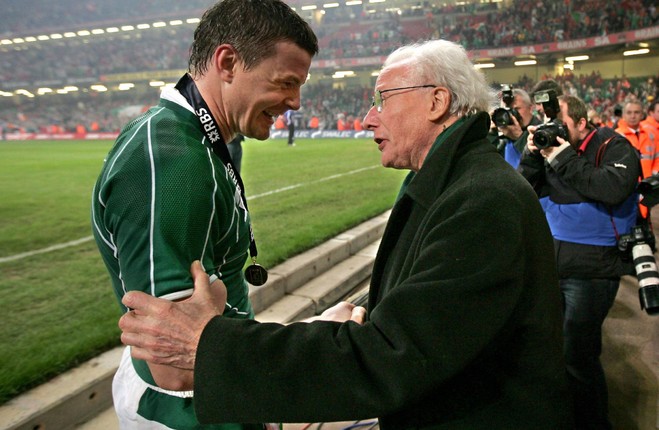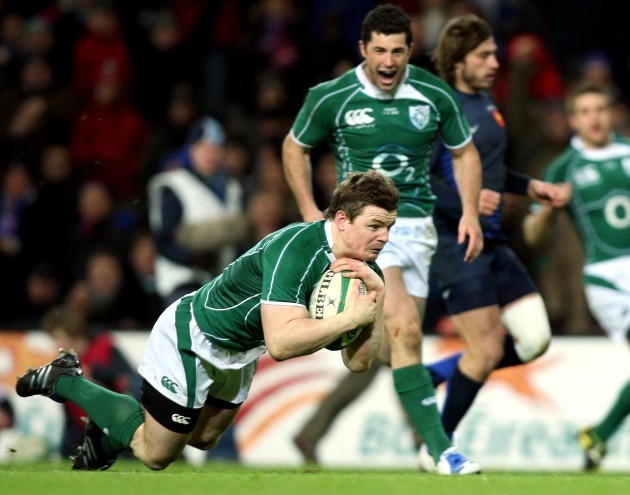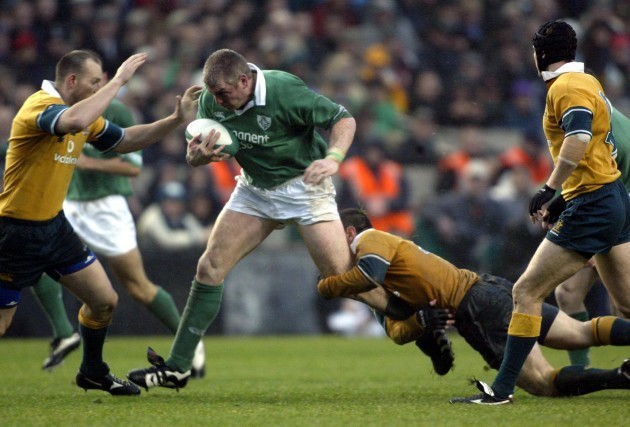LIKE ALL GOOD stories, this one starts in a toilet with a sportsman getting sick. Perhaps a little context is needed. Brian O’Driscoll was suffering from vertigo when he made his little visit to the bathroom.
It was the night Ireland finally ended their grand slam famine and rather than celebrate the most memorable victory in Ireland’s Six Nations history, O’Driscoll was battling a minor illness in his hotel bedroom, alone with his thoughts, his puke and the Six Nations trophy.
He tells the story to Owen Slot, The Times’ rugby correspondent, in a special edition of their Ruck podcast, which was uploaded onto their website today. In a fascinating interview, O’Driscoll outlined the team’s journey from no-hopers to champions, as well as detailing his own battles with self-doubt in the lead-in to that 2009 season.
We were concerned we were going to be bridesmaids forever,” O’Driscoll says.
And then there were his own personal demons. By 2009, he was 28 and the sum total of his medal collection came to one – a Celtic League winners medal from 2001. The question of his suitability to remain as captain was being raised.
“Trying to be a strong voice when six of the pack were from Munster was challenging because you didn’t feel you were coming from a position of power,” O’Driscoll tells Slot. “So something had to change in my own head. I had to do things in my own game to show leadership. Whatever about the off the field stuff, captaincy, a huge amount of being a good captain is the way you perform on the field.”
So he approached Ronan O’Gara to ask for his perspective.
“I had a great relationship with ROG and knew he would tell it to me as it is,” O’Driscoll says. “I knew I’d get the truth. He said you are the right person but you need to get a bit fitter. It stung a little bit but he was right. I did need to get leaner and get back to the core of what I was good at. I took it to heart and started improving on everything, nutrition, hydration.”
More relevantly, he improved on the field of play. Rather than seeing him get old, in 2009 Irish rugby once again saw the old O’Driscoll – as he scored key tries against France, Italy, England and Wales en route to their first grand slam since 1948.
But before we get to all that, let’s press the rewind button.
It’s 1999.
“I was brought in pretty much from obscurity to the Irish set-up, playing AIL Division Three rugby. The international team was going through a period where results were poor, our play inconsistent. At underage level, up to U21s, you always felt we were very competitive and then at senior level, we fell off a cliff.”
Then, in 1999 O’Driscoll emerges, followed a year later by five new caps, O’Gara, John Hayes, Simon Easterby, Shane Horgan and Peter Stringer. Scotland are beaten for the first time in over a decade, France subsequently lose at home to Ireland for the first time since 1972.
“And all of a sudden there was a realisation within us all that these players were used to winning with the provinces, so why should it stop once we step up a level?
“That can be a slow process. We did not get consistency immediately but we picked teams off one by one – Scotland and France in 2000, England in 2001, Australia in 2002, South Africa in 2004 – out first wins over each of those nations in years. Eventually, it became a case of putting it all together.”
If only it was that easy. Five times – in 2001, 2003, 2004, 2006 and 2007 – Ireland finished runners-up, one game shy of a grand slam each time.
“We were close but far away. You look at some of our losses in those seasons and they were big ones – a couple of hidings in the Stade de France, a big defeat at home to England in 2003. It felt we were close but it also felt, ‘look let’s not think we are chocolate just yet’. There is a lot of work to be done to actually get to that point to really contest a grand slam. The gulf was still in existence.”
Come the end of 2008, a bit of panic had set in for O’Driscoll.
“I thought I am running out of time here,” he tells Slot. “Sometimes all you need is a bit of change and focus. I had to remind myself that my best days weren’t behind me.
I spoke to Michael Cheika and that gave me a real focus of trying to play my best individually and trying to be a catalyst for others as well. From 28, I became a much better professional.”
He shed some weight and re-tuned his game. “I was never a collision winner, I was someone who beats people with footwork and on an outside break, so I needed to be leaner and go back to the core of what I was good at. All of a sudden I had three tries in the first three games of 2009 and that was vital to eradicate any self-doubt.”
So too did a conversation over a drink with Tomas O’Leary, the Ireland scrum half, after round two of the 2009 campaign. Italy had just been beaten that afternoon, Ireland’s second win on the trot in that championship.
I remember being in the bar having a drink with Tomas and he joked, ‘you guys have been at this for years, you needed a couple of us new guys to help you (get over the line)’. And that moment genuinely filled me with confidence. I was thinking ‘this guy doesn’t care about our near misses in the past’. He felt under no pressure and that, genuinely, felt like the extra injection of confidence I needed. The Six Nations is about building, you don’t win it in week one or two but that is where you get the momentum.”
Week three of the season brought a third successive try from O’Driscoll and a third successive win for Ireland, England their victims that day.
“We just fronted up,” he says. “Sometimes as player you just get a huge sense of satisfaction from rolling your sleeves up and winning the game. After getting another try, any self-doubt was eradicated by that stage.”
The Scots were next.
“We felt more pressure against Scotland than we did against Wales. People brush over the Scotland game as a non-event but it was mentally much more challenging. Teams often come unstuck if they have one eye on the final game instead of the penultimate one.”
And then the grand slam day against the Welsh – a poor first half followed by a superb third quarter.
“Sometimes you need to have fun and express yourselves. We did that after the break, had our purple patch.”
Wales came back, retook the lead; Ireland claimed it back via a drop goal from O’Gara. On it went. The Welsh had one final shot at glory, Stephen Jones standing over a last-minute penalty.
“I kind of thought, this is so brutal that we are going to miss out on a grand slam because of indiscipline,” O’Driscoll said. “I just thought if there is any justice, he’ll miss it. He missed by a couple of metres. ‘Thanks be to Jaysus,’ I said to myself. Had we lost, we would have been written off as chokers. It became a positive focal point at a time of adversity in our country’s history.
“We took a lot from people saying we were able to offer something different to a pretty depressing time in Ireland, with the recession and everything.
“But it came down to a bit of luck. We should have won it in 2007 but in 2009 we got our breaks. I don’t want to short-change ourselves but in other years we didn’t get that luck. We worked for it and we just didn’t make the mistakes we had before and got a bit fortunate in the places we had faltered in the past. I’m not going to try and over-egg it.”
* This is the link to Owen Slot’s interview with Brian O’Driscoll
https://www.thetimes.co.uk/edition/sport/how-to-win-a-grand-slam-brian-odriscoll-pjd896qr2








